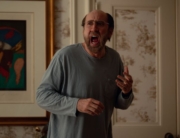At its heart, My Amityville Horror is about what happens to a normal person put through extraordinary, horrifying, and traumatic experiences, and how he comes out on the other side. When we first see chain-smoking Daniel Lutz, now in his mid-40s, he looks like a tough-as-nails blue-collar guy, and, as an aside, he jams like a stand-in for Eddie Van Halen on the guitar. But when he sits down, we know by his troubled eyes there has to be much more to his story. And there is.
The Amityville house, of course, lead to the book and a series of movies. As a 10-year-old boy, Daniel didn’t really want to move into his new home. His mother remarried a man named George Lutz, and, along with changing the last names of the children legally, Lutz bought a very big house in Amityville out on Long Island, right on the edge of the water, with a spiral staircase and so many rooms one could get lost. At the very first, Daniel was excited until he entered a room which had hundred flies. Why were they there? Um…
My Amityville Horror is not simply about a real-life story that got made into the 1979 sensationalistic movie with James Brolin and Margot Kidder (or, for you young folks, with Ryan Reynolds in 2005), but about a boy witnessing his family being torn apart and attacked mercilessly by a spectral presence. To back up Daniel’s story, the director Eric Walter also interviews psychologists, one of whom sits in on camera with Daniel during a therapy session, where the patient explains simply that he wants to get better for his kids.
The film’s power comes from his relationship with his stepfather, who passed away in 2006. Not that George would really get close enough to Daniel to be called “dad.” He was called, by directive, “sir” or “Mr. Lutz.” By the accounts from Daniel and other sources interviewed—investigative journalists going over the old story once more—George was a very stern, rough man to get along with, and, quite possibly, if one believes such things, he brought the supernatural phenomena to the Amityville house. Daniel may have become possessed, or he may have not. It becomes one of the film’s most intriguing beats, one that is given enough time, though I wish there was a little more about how George was deep into the occult, with books about black magic, mind control, séances, the list goes on.
Is Daniel trustworthy? He doesn’t come off as a BS-artist in the slightest, though there is a psychologist who says that Lutz may be putting out the same signals that someone who wants to be trusted would: detailed descriptions, up-front mannerisms, and everyday speech. Daniel admits he doesn’t even want to tell his story because it means going back to his own troubled family past: the abuse from George, his disassociation from his mother, and, eventually, running away a couple of times from home and dropping out of school. When you’re the Amityville Kid, that sort of thing happens, I guess.
Walter crafts a convincing argument for either side: Daniel may be telling the truth, if not about all the paranormal stuff (you believe what you want to believe on that) then about the family horrors, or he may be making a lot of it up for dramatic effect. But he’s the only one of the original family, besides a cousin, interviewed for the film and the only family member to cooperate. By the end, Lutz comes off as intelligent, unafraid, and at times tired of all this crap (like at the end with the off-camera interviewer). But a good storyteller? Damn right. He and those interviewed paint a tragic, bizarre portrait of familial dysfunction wrapped up in (if not in the guise of) a supernatural horror story.







Leave A Comment